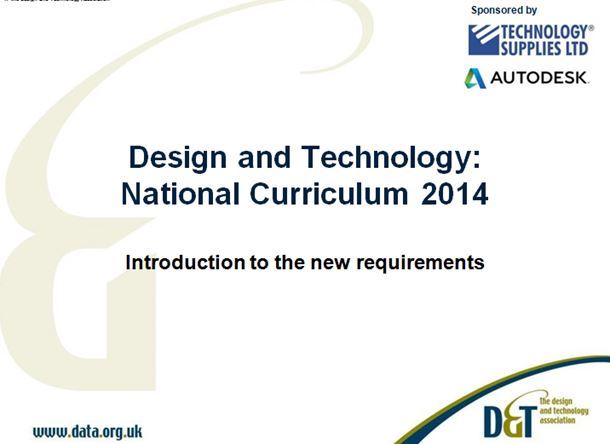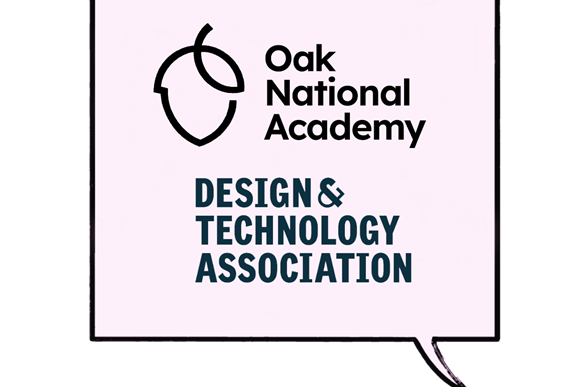Design and Technology National Curriculum for England 2014
To support schools the Design and Technology Association provides training, advice, information, and guidance regarding the National Curriculum Design and Technology Programmes of Study introduced in September 2014, we have produced a number of resources, and will continue to, including some developed in collaboration with the National Curriculum Expert Group for Design and Technology.
During the National Curriculum review the Department for Education (DfE) set up the Expert Group. This was given the task of advising the DfE on implementation and worked closely with the Design and Technology Association.
Key messages, advice and explanatory notes for schools
The revised programmes of study are slimmer and set out only the essential, core knowledge, understanding and skills that all pupils should learn from Key Stages 1 to 3. Schools need to consider wider aspects of Design and Technology not included in the National Curriculum which they would like to teach as part of their own school curriculum.
The publication in the Associated Files box below, Key messages, advice and explanatory notes for schools, has been written to help primary and secondary schools interpret words and phrases in the programmes of study that need further explanation. It also provides initial advice on how the new requirements can be implemented effectively to ensure good quality teaching and learning.
School Curriculum Principles for Design and Technology
To support implementation of the programmes of study, six interrelated principles were agreed by the National Curriculum Expert Group for Design and Technology. They describe the features of a genuine Design and Technology experience from the pupils’ perspective and can be applied to all material areas and aspects of the subject. Each principle should be evident to a greater or lesser degree in each project that pupils undertake. The principles do not represent an exhaustive list, but provide a helpful starting point for clarifying and securing the distinctive nature of Design and Technology in the classroom. The National Curriculum requirements are consistent with the six principles.
Freely available guidance on each of the six principles can be accessed from the link below. The purpose of the guidance is to enable primary and secondary teachers and trainees to evaluate their own practice, reflecting on the experience they are providing for pupils in relation to each of the principles. Each principle is defined and illustrated through examples of practice in Key Stages 1 to 3.
The School Curriculum Principles for Design and Technology file can be found below.
National Curriculum myths and facts
The primary and secondary myths and facts documents provide answers to frequently asked question concerning implementation of the new programmes of study. These will be added to as other answers are provided to questions from Design and Technology Association members.
Formative Assessment: Initial Guidance statement
With the removal of the use of levels for assessing progress in National Curriculum subjects, schools are now able to focus their teacher assessment and reporting in Design and Technology, not on a set of opaque level descriptions but on the essential knowledge, understanding and skills that all pupils should learn. The short statement (found as a pdf below) provides out some commentary from DfE and sets out some guiding principles to inform the development of schools’ individual approaches.
Design and Technology Progression Framework
This resource has been developed as a progression framework for Design and Technology. It is presented here as a freely downloadable pdf and has been developed further as a 'clickable' version of the resource for Key Stages 1 and 2 to help teachers plan their own school curriculum. It should be considered together with the brief Progression Framework Guidance document.
The framework provides steps for progression in pupils’ knowledge, understanding and skills. These include but go beyond the new programmes of study. Age-related expectations have been developed for KS1, early and late KS2, and early and late KS3. These are intended to help teachers plan activities which build on pupils’ previous learning and ensure an appropriate level of challenge. The intention is for pupils’ learning to be developed cumulatively. This means that learning from previous key stages should be revisited in teachers’ planning and practice and used in a more sophisticated way in subsequent key stages. Some of the age-related expectations are generic and ongoing, whereas others are specific to particular projects.
The framework could also be used to inform assessments of pupils’ performance in Design and Technology as they progress through school. The KS1-2 content has been included as part of the Design and Technology Association’s primary resource, Projects on a Page.
The Design and Technology Expert Group
Some of the resources available here have been produced by or with advice from the Design and Technology Expert Group. These individual subject groups were established by the Department for Education (DfE) in 2013. In the first instance their remit was to provide them with advice on the implications of the new National Curriculum for initial teacher training (ITT).
Associated Files
l Annotated Programme of Study l Design and Technology Progression Framework Guidance l Progression Framework KS1 KS2 l Progression Framework KS1-3 l Formative Assessment Initial Guidance l National Curriculum 2014 - Primary myths and facts l National Curriculum 2014 - Secondary myths and facts l School Curriculum Principles for D&T l Design and Technology programme of study - KS1-3 l Clickable Progression Framework KS1-2.pdfJoin Now
Design and Technology (D&T) is the inspiring, rigorous and practical subject which prepares all young people to live and work in the designed and made world.
We are focused on giving you the tools, knowledge and information you need to become more effective, more experienced and more efficient. Giving you access to expert opinions. And creating a place where you can air your views, ask your questions and so help make a difference to your life and those of your pupils. We want to hear from you. We want to know how we can help. And we want you to join us.






